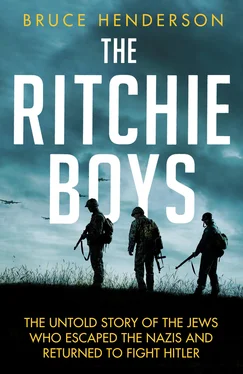When they reached New York, a committee representative decided that Günther, after all his private lessons from Herr Tittel, was fluent enough in English to travel by himself the rest of the way to St. Louis. He would have to change trains in Chicago, however, so someone would meet him there and help him make his connection.
During his short time in the heart of New York City, Günther was most impressed by the jumble of skyscrapers, the crowded subways, and the curious Automatenrestaurants, or automats, at which busy people inserted coins in machines and instantly received sandwiches and other food items.
He arrived in Chicago on a Sunday and had a three-hour layover. The woman who met him decided they had time for a quick tour of the Windy City. The excursion included a stroll through the open-air Maxwell Street Market, which occupied several square blocks. Founded in 1912 by newly arrived Jewish immigrants from eastern Europe, the market featured booths selling a variety of discounted items: produce, clothes, tools, and all things in between. To Günther, it was a wild mix of cultures and ethnicities; he saw people of all colors and ages, many of them Jews, intermingling easily, talking and joking with each other.
Günther had never seen anything like this in Germany. If this was what it meant to be in America, the land of the free, his days of trying to disappear in public like invisible ink were over.
After another long train trip, he arrived in St. Louis. His aunt Ethel and cousin Melvin met him at the station. Uncle Benno, his mother’s brother, was working the night shift at a bakery, and Günther did not meet him until he came home later that night. His uncle’s story was familiar to Günther; as a rebellious youth of fourteen or fiftteen, Benno had been exiled by his strict father, who sent him to America in the days when it was easier for immigrants to gain entry. Benno was a short, squat man who had been stymied but not defeated by the Depression. The Silberbergs did not live easy lives, but they had never been threatened with eviction or relegated to standing in a breadline for their next meal. Benno did not apologize for the family’s cramped apartment, located in a subdivided mansion on the predominantly Jewish west side, though the accommodations were markedly different from Günther’s family’s spacious, well-appointed home in Hildesheim. Nor was any explanation offered for Günther having to share a small room and a single bed with another refugee boy, Rudy Solomon, whom his aunt had taken in at the request of the Jewish Aid Society.
Although he quickly began to miss his own family and ache for home, Günther’s youthful dreams of adventure in his new country remained intact, no more so than when he enrolled five days later in Soldan High School, a public school reputed to be the finest in St. Louis. At Soldan, students from affluent families sat next to those in threadbare clothes, and all of them were taught and inspired by dedicated teachers and administrators determined to rival the top college-prep schools in the country. It was America at its best.
On his first day, Günther was received personally by the principal, who told him he had been assigned to the homeroom of Mrs. Muller, the German language teacher. When the principal asked if he was interested in any extracurricular activities, Günther quickly answered, “Swimming and the school newspaper.”
His first class was geometry, and after being warmly welcomed by the teacher—“our new student from Germany!”—he discovered that the class had just started taking a test. Mrs. Carmody, the geometry teacher, encouraged him to take it, too, in order to “show what you can do.” Günther sat down and read through the questions. Approaching the teacher’s desk, he asked softly, “Please, what is ‘isosceles triangle’?”
She went to the blackboard and drew one.
“Ah, yes,” Günther said. “Ein gleichschenkliges Dreieck.”
He took the test, and received a G for good.
Before long, his natural curiosity led to his becoming a reporter for the school paper, Scrippage, whose name was borrowed from Shakespeare’s As You Like It. Günther got a job in the cafeteria, working for free hot lunches, and in the spring became the number-three breaststroker on the varsity swim team. By then, he had his first girlfriend, Idamae Schwartzberg, an energetic, attractive brunette. They went to free summer musicals, such as the Gershwins’ Of Thee I Sing and Jerome Kern and Oscar Hammerstein’s Show Boat, performed outdoors at Forest Park.
Even though she had a rather improbable name of her own, Idamae had little patience for Günther’s name, which she termed a “German tongue twister.” She decided he should retain the first two letters and add a “y.” Happy to assimilate, Günther became Guy. It caught on; everyone agreed that the name suited his upbeat personality well.
And his transformation was not in name only. The past several years in Germany, during which he had been required to be endlessly unobtrusive, had led to an inevitable loss of confidence, even feelings of worthlessness. Guy’s climb back to self-assurance and self-worth in his country of refuge came faster than anyone, even he, would have thought possible. His kind heart, winning smile, and playful sense of humor won him a legion of new friends.
Guy’s two biggest stories for the school paper, which earned him the nickname “Scoop,” were interviews with bandleader Benny Goodman backstage at the Fox Theater in midtown St. Louis—they discussed jazz and swing for half an hour—and the German novelist Thomas Mann, winner of the Nobel Prize in Literature (1929), who came to town for a lecture at the Young Men’s Hebrew Association.
Mann, who wrote in German, was accompanied by his daughter, Erika, an actress and writer who translated his books and speeches into English. With a heavy German accent, he read his speech, “The Coming Victory of Democracy,” in precise but at times uncertain English, to a capacity crowd of three thousand. He damned the Munich Agreement of 1938 as a “betrayal” by England and France for permitting Germany to annex the Sudetenland portions of Czechoslovakia, which Hitler proclaimed as German territory. He criticized British prime minister Neville Chamberlain’s efforts to appease Hitler and warned that Hitler’s thirst to expand Germany’s borders at the expense of other nations could not be quenched.
Afterward, some twenty chairs were set up in another room for a press conference. Mann arrived before his daughter, who had earlier interpreted some questions from the audience for her father. Mann would answer in German, and she would report: “My father believes . . .” Now, rather than await Mann’s interpreter, a Time correspondent asked a convoluted question in English, which stumped the novelist. Guy piped up, repeating the query in German and then translating Mann’s answer into English.
With Mann looking directly at him, Guy summoned the courage to ask his own question—also in German. Even in such august company, Guy’s inquiry revealed his own sharp intellect and grasp of current events. Did Mann, a well-known anti-Nazi advocate since his exile from Germany after Hitler came to power, think that the German dictator and Stalin could find common cause? Mann vigorously denied the possibility. “Dictators can never be appeased,” Mann told Guy, “because they will never be satisfied with their territorial gains.”
In what amounted to an exclusive interview for Guy, the German novelist went on to discuss his advocacy for national health insurance in the United States in his native tongue. Guy took notes in shorthand, which he had learned in school in Germany, as Mann explained that a democracy is only strong if every citizen is guaranteed his own social well-being, which must include affordable medical treatment, a chance for an education, and a pension.
Читать дальше












